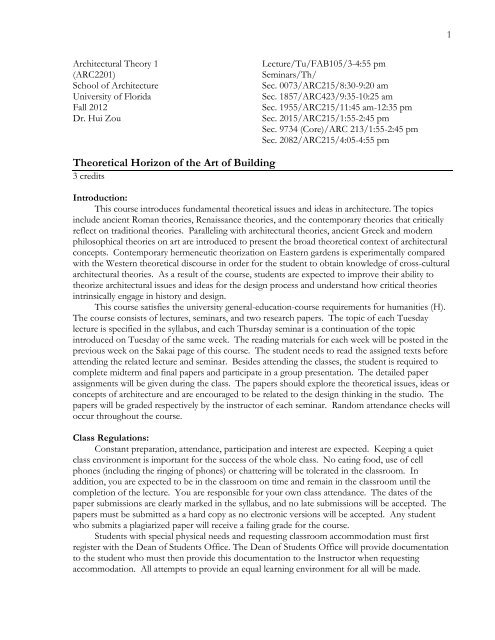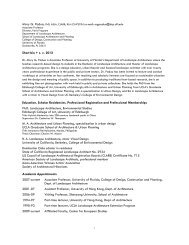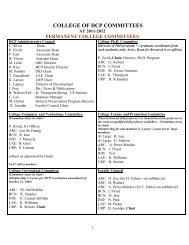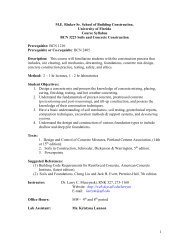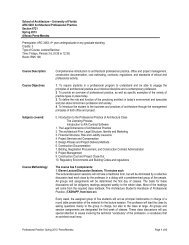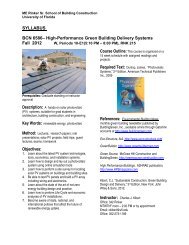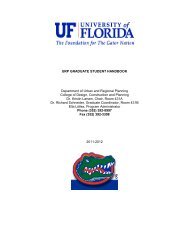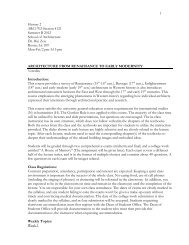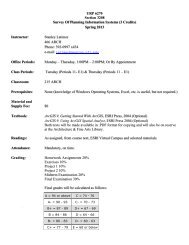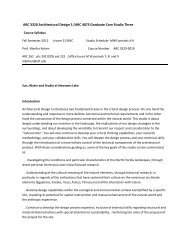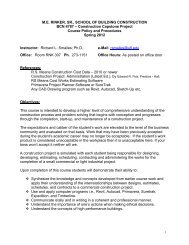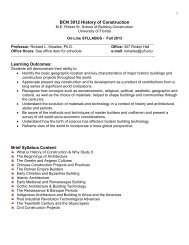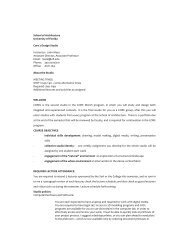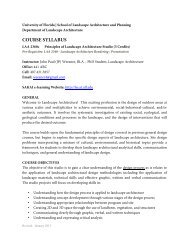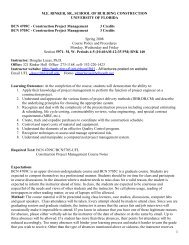ARC 2201 Theory of Architecture 1 - University of Florida
ARC 2201 Theory of Architecture 1 - University of Florida
ARC 2201 Theory of Architecture 1 - University of Florida
You also want an ePaper? Increase the reach of your titles
YUMPU automatically turns print PDFs into web optimized ePapers that Google loves.
1Architectural <strong>Theory</strong> 1(<strong>ARC</strong><strong>2201</strong>)School <strong>of</strong> <strong>Architecture</strong><strong>University</strong> <strong>of</strong> <strong>Florida</strong>Fall 2012Dr. Hui ZouLecture/Tu/FAB105/3-4:55 pmSeminars/Th/Sec. 0073/<strong>ARC</strong>215/8:30-9:20 amSec. 1857/<strong>ARC</strong>423/9:35-10:25 amSec. 1955/<strong>ARC</strong>215/11:45 am-12:35 pmSec. 2015/<strong>ARC</strong>215/1:55-2:45 pmSec. 9734 (Core)/<strong>ARC</strong> 213/1:55-2:45 pmSec. 2082/<strong>ARC</strong>215/4:05-4:55 pmTheoretical Horizon <strong>of</strong> the Art <strong>of</strong> Building3 creditsIntroduction:This course introduces fundamental theoretical issues and ideas in architecture. The topicsinclude ancient Roman theories, Renaissance theories, and the contemporary theories that criticallyreflect on traditional theories. Paralleling with architectural theories, ancient Greek and modernphilosophical theories on art are introduced to present the broad theoretical context <strong>of</strong> architecturalconcepts. Contemporary hermeneutic theorization on Eastern gardens is experimentally comparedwith the Western theoretical discourse in order for the student to obtain knowledge <strong>of</strong> cross-culturalarchitectural theories. As a result <strong>of</strong> the course, students are expected to improve their ability totheorize architectural issues and ideas for the design process and understand how critical theoriesintrinsically engage in history and design.This course satisfies the university general-education-course requirements for humanities (H).The course consists <strong>of</strong> lectures, seminars, and two research papers. The topic <strong>of</strong> each Tuesdaylecture is specified in the syllabus, and each Thursday seminar is a continuation <strong>of</strong> the topicintroduced on Tuesday <strong>of</strong> the same week. The reading materials for each week will be posted in theprevious week on the Sakai page <strong>of</strong> this course. The student needs to read the assigned texts beforeattending the related lecture and seminar. Besides attending the classes, the student is required tocomplete midterm and final papers and participate in a group presentation. The detailed paperassignments will be given during the class. The papers should explore the theoretical issues, ideas orconcepts <strong>of</strong> architecture and are encouraged to be related to the design thinking in the studio. Thepapers will be graded respectively by the instructor <strong>of</strong> each seminar. Random attendance checks willoccur throughout the course.Class Regulations:Constant preparation, attendance, participation and interest are expected. Keeping a quietclass environment is important for the success <strong>of</strong> the whole class. No eating food, use <strong>of</strong> cellphones (including the ringing <strong>of</strong> phones) or chattering will be tolerated in the classroom. Inaddition, you are expected to be in the classroom on time and remain in the classroom until thecompletion <strong>of</strong> the lecture. You are responsible for your own class attendance. The dates <strong>of</strong> thepaper submissions are clearly marked in the syllabus, and no late submissions will be accepted. Thepapers must be submitted as a hard copy as no electronic versions will be accepted. Any studentwho submits a plagiarized paper will receive a failing grade for the course.Students with special physical needs and requesting classroom accommodation must firstregister with the Dean <strong>of</strong> Students Office. The Dean <strong>of</strong> Students Office will provide documentationto the student who must then provide this documentation to the Instructor when requestingaccommodation. All attempts to provide an equal learning environment for all will be made.
Weekly Topics:Week 1Th (Aug 23)/ Seminar: Meet with GTAWeek 2Tu (Aug 28)/ Lecture: Introduction; Vitruvius, “Book I,” p. 3-32Th/ SeminarWeek 3Tu/ Vitruvius, “Book II,” p. 35-42; “Book III,” p. 69-75; “Book IV,” p. 101-9Th/ SeminarWeek 4Tu/ Vitruvius, “Book V,” p. 137-53; “Book IX,” p. 251-70Th/ SeminarWeek 5Tu/ Plato, ch. 9-ch. 26: p. 57-82Th/ SeminarWeek 6Tue/ Alberti, Book I, p. 7-32Thu/ SeminarWeek 7Tu/ Yates, “Camillo’s Theater,” p. 129-59Th/ SeminarWeek 8Tu/ Vesely, “Architectonics <strong>of</strong> Embodiment,” p. 28-43; “<strong>Architecture</strong> and the Question <strong>of</strong>Technology,” p. 28-49Th (Oct 6)/ Seminar: Midterm paper due in classWeek 9Tu/ Pérez-Gómez, “Chora,” p. 1-34Th/ SeminarWeek 10Tu/ Heidegger, “The Origin <strong>of</strong> the Work <strong>of</strong> Art” (1), p. 143-65Th/ SeminarWeek 11Tu/ Heidegger, “The Origin <strong>of</strong> the Work <strong>of</strong> Art” (2), p. 165-203Th/ SeminarWeek 12Tu/ Heidegger, “Building Dwelling Thinking,” p. 343-64Th/ SeminarWeek 13Tu/ Holl, “Intertwining,” with Pérez-Gómez’s “Introduction,” p. 9-16.Th/ Seminar: Group presentationsWeek 14Tu/ Zou, “Philosophical Encounter.”Th/ (No class, Thanksgiving)Week 15(No class; writing the final paper)Week 16Tu (Dec 3)/ (No class; final paper due by 4:30 pm in <strong>ARC</strong>231).2
3Textbook:Vitruvius. The Ten Books <strong>of</strong> <strong>Architecture</strong>. Dover, 1960.References:Alberti, Leon B. On the Art <strong>of</strong> Building in Ten Books. MIT, 1996.Heidegger, Martin. “The Origin <strong>of</strong> the Work <strong>of</strong> Art.” Basic Writings.---. “Building Dwelling Thinking.” Basic Writings.Holl, Steven. Intertwining. Princeton Architectural, 1996.Pérez-Gómez, Alberto. “Chora: The Space <strong>of</strong> Architectural Representation.” Chora 1. McGill-Queens, 1994.Plato, Timaeus and Critias. Penguin, 1977.Vesely, Dalibor. “The Architectonics <strong>of</strong> Embodiment.” Body and Building. MIT, 2002.---. “<strong>Architecture</strong> and the Question <strong>of</strong> Technology.” <strong>Architecture</strong>, Ethics, and Technology. McGill-Queen,1994.Yates, Frances A. The Art <strong>of</strong> Memory. <strong>University</strong> <strong>of</strong> Chicago, 1966.Zou, Hui. “The Philosophical Encounter Embodied by the Yuanming Yuan.” Journal <strong>of</strong> EnvironmentalPhilosophy 7, no. 1 (Spring 2010), USA.Grading:Midterm paper: 40%Final project: 40%Participation (including group presentation): 20%You can find the university grading policy at:http://www.registrar.ufl.edu/catalog/policies/regulationgrades.htmlGrading Scale:LetterA A- B+ B B- C+ C C- D+ D D- EGradeNumericGradeQualityPoints93-100Office Hours:2 pm-3 pm, Tu90-9287-8983-8680-8277-794.0 3.67 3.33 3.0 2.67 2.33 2.0 1.67 1.33 1.0 0.67 0.0Contact:Office: <strong>ARC</strong>H 252Tel: (352) 392-0205 ext 216E-mail: hzou@ufl.eduGraduate Teaching Assistants: (TBA)73-7670-7267-6963-6660-620-59


